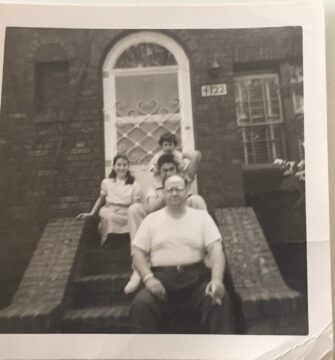by Barbara Fischkin

Moving forward, I plan to use this space to experiment with chapters of a memoir. Please join me on this journey. Another potential title: “Barbara in Free-Range.” I realize this might be stepping on the toes of Lenore Skenazy, the celebrated former New York News columnist, although I don’t think she’d mind. Lenore was also born a Fishkin, albeit without a “c” but close enough. We share a birthday and the same sensibilities about childhood. These days Lenore uses the phrase “free-range,” typically applied to eggs, to fight for the rights of children to explore on their own as opposed to being over-supervised and scheduled.
I feel free-range, myself. I don’t like rules, particularly the unnecessary and ridiculous ones. My friend Dena Bunis, who recently died suddenly and too soon, once got a ticket for jaywalking on a traffic-free bucolic street in Orange County, California. She never got a jaywalking ticket in other far more congested places like New York City and Washington, D.C.
As a kid, I was often free-range, thanks to my parents, old timers blessed with substantial optimism. I have been a free-range adult. I was a relatively well-behaved teen but did not become a schoolteacher as recommended as a good job for a future wife and mother. I wanted a riskier existence as a newspaper reporter. I did not marry the doctor or lawyer envisioned as the perfect husband for me by ancillary relatives and a couple of rabbis. Instead, I married Jim Mulvaney, now my Irish Catholic spouse of almost forty years, because I knew he would lead, join or follow me into adventures.
I left newspapering as my career was blooming to write books, none of which made me a literary icon or even a little famous. I am glad I wrote them. Read more »

 That is, we had to talk about it. I thought of a musician as someone who made a living performing music. I didn’t do that. To be sure, I made some money playing around town in a rock band and I’d spent years learning the trumpet. I’d marched in parades and at football games; I’d played concerts with various groups. But I wasn’t a full-time, you know, a professional musician, a real musician. Gren insisted that I was a musician because I played music, a lot, and was committed to it. That’s all that’s necessary.
That is, we had to talk about it. I thought of a musician as someone who made a living performing music. I didn’t do that. To be sure, I made some money playing around town in a rock band and I’d spent years learning the trumpet. I’d marched in parades and at football games; I’d played concerts with various groups. But I wasn’t a full-time, you know, a professional musician, a real musician. Gren insisted that I was a musician because I played music, a lot, and was committed to it. That’s all that’s necessary.